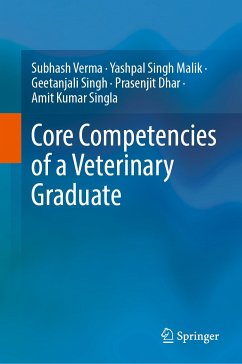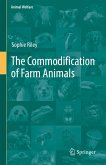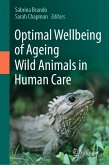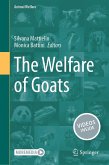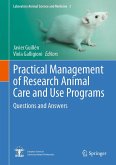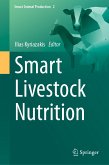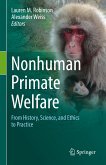Core Competencies of a Veterinary Graduate (eBook, PDF)


Alle Infos zum eBook verschenken

Core Competencies of a Veterinary Graduate (eBook, PDF)
- Format: PDF
- Merkliste
- Auf die Merkliste
- Bewerten Bewerten
- Teilen
- Produkt teilen
- Produkterinnerung
- Produkterinnerung

Hier können Sie sich einloggen

Bitte loggen Sie sich zunächst in Ihr Kundenkonto ein oder registrieren Sie sich bei bücher.de, um das eBook-Abo tolino select nutzen zu können.
This book is an essential guide for veterinarians, veterinary faculty and policymakers for understanding the core competencies of a fresh veterinarian. The book briefly covers competencies in preclinical, paraclinical, and clinical subjects including anatomy, physiology, biochemistry, veterinary jurisprudence, animal management & welfare including nutrition and breeding, infectious and non-infectious diseases, disease epidemiology, diagnosis, and treatment, prevention, control and zoonoses, surgical and other clinical interventions. The book further includes other competencies, including…mehr
- Geräte: PC
- ohne Kopierschutz
- eBook Hilfe
- Größe: 9.3MB
![Production Diseases in Farm Animals (eBook, PDF) Production Diseases in Farm Animals (eBook, PDF)]() Production Diseases in Farm Animals (eBook, PDF)113,95 €
Production Diseases in Farm Animals (eBook, PDF)113,95 €![The Commodification of Farm Animals (eBook, PDF) The Commodification of Farm Animals (eBook, PDF)]() Sophie RileyThe Commodification of Farm Animals (eBook, PDF)105,95 €
Sophie RileyThe Commodification of Farm Animals (eBook, PDF)105,95 €![Optimal Wellbeing of Ageing Wild Animals in Human Care (eBook, PDF) Optimal Wellbeing of Ageing Wild Animals in Human Care (eBook, PDF)]() Optimal Wellbeing of Ageing Wild Animals in Human Care (eBook, PDF)89,95 €
Optimal Wellbeing of Ageing Wild Animals in Human Care (eBook, PDF)89,95 €![The Welfare of Goats (eBook, PDF) The Welfare of Goats (eBook, PDF)]() The Welfare of Goats (eBook, PDF)121,95 €
The Welfare of Goats (eBook, PDF)121,95 €![Practical Management of Research Animal Care and Use Programs (eBook, PDF) Practical Management of Research Animal Care and Use Programs (eBook, PDF)]() Practical Management of Research Animal Care and Use Programs (eBook, PDF)137,95 €
Practical Management of Research Animal Care and Use Programs (eBook, PDF)137,95 €![Smart Livestock Nutrition (eBook, PDF) Smart Livestock Nutrition (eBook, PDF)]() Smart Livestock Nutrition (eBook, PDF)137,95 €
Smart Livestock Nutrition (eBook, PDF)137,95 €![Nonhuman Primate Welfare (eBook, PDF) Nonhuman Primate Welfare (eBook, PDF)]() Nonhuman Primate Welfare (eBook, PDF)129,95 €
Nonhuman Primate Welfare (eBook, PDF)129,95 €-
-
-
Dieser Download kann aus rechtlichen Gründen nur mit Rechnungsadresse in A, B, BG, CY, CZ, D, DK, EW, E, FIN, F, GR, HR, H, IRL, I, LT, L, LR, M, NL, PL, P, R, S, SLO, SK ausgeliefert werden.
- Produktdetails
- Verlag: Springer Nature Singapore
- Seitenzahl: 295
- Erscheinungstermin: 13. April 2024
- Englisch
- ISBN-13: 9789819704330
- Artikelnr.: 70335784
- Verlag: Springer Nature Singapore
- Seitenzahl: 295
- Erscheinungstermin: 13. April 2024
- Englisch
- ISBN-13: 9789819704330
- Artikelnr.: 70335784
- Herstellerkennzeichnung Die Herstellerinformationen sind derzeit nicht verfügbar.
Prof. Yashpal Singh Malik is serving as the Dean of the College of Animal Biotechnology, Guru Angad Dev Veterinary and Animal Sciences University, Ludhiana, India. He is a recipient of the prestigious position "ICAR National Fellow" at the ICAR-Indian Veterinary Research Institute. His areasof expertise are rotaviral diseases, viral disease epidemiology, microbial biodiversity, host-virus interactions, and pathogen-diagnostics. He has pursued advanced studies in molecular virology at the University of Minnesota, USA; University of Ottawa, Ontario, Canada; and Wuhan Institute of Virology, Wuhan, China. Prof. Malik is serving as the chair picobirnavirus family at the World Health Organization. He is the recipient of several prestigious national, state and academy awards and honours, including the ICAR-Jawaharlal Nehru Award. He has authored several books and book chapters, and various research and review articles. Prof. Malik has been associated with societies of international repute, like, the Secretary General of the World Society for Virology, Federation of Asian Veterinary Association, World Veterinary Association, International Committee for Taxonomy of Viruses and at national level serving as Secretary General of Indian Virological Society. Prof. Malik is the series editor for Springer's "Livestock Disease Management" book series. He is the Editor-in-Chief of various journals. He has been awarded a prestigious Fellowship by the Academy of Microbiological Sciences, National Academy of Veterinary Sciences and National Academy of Dairy Sciences.
Dr. Geetanjali Singh is professor and head in the Department of Veterinary Physiology and Biochemistry, Dr GC Negi College of Veterinary and Animal Sciences, CSK Himachal Pradesh Agricultural University, Palampur, India. She has earlier served as an assistant professor of animal nutrition & a veterinary officer in the government sector. She was a visiting associate professor at University of Queensland, Brisbane, Australia and eco development specialist in Indo German Eco Development project run by Indian and German Governments in lower Himalayan region of India. After graduating as a vet and specializing in animal nutrition she pursued her Masters in Applied Biomolecular Technology from University of Nottingham, UK and PhD in Medical Biochemistry and Molecular Biology from University of Glasgow, UK. Her research interests include early biomarker of diseases & biochemical and molecular characterization of native animal breeds. She has been conferred with various prestigious awards notably, Commonwealth Award by the Department for International Development, United Kingdom, Wellcome Trust Value in People Award, Rapid Grant for Young Investigator by Department of Biotechnology India and Woman Scientist Award by Indian Society for Veterinary Immunology and Biotechnology etc. She is on the panel of mentors of commonwealth students and has worked as principal investigator and co-principal investigator in many research projects. She has more than 20 years of teaching experience in the field of Veterinary Biochemistry and Animal Nutrition. She has published in the peer-reviewed journals and co-authored books and book chapters.
Dr. Prasenjit Dhar is currently working as a Professor in the Department of Veterinary Microbiology, Dr GC Negi College of Veterinary & Animal Sciences, Himachal Pradesh Agricultural University, Palampur, Himachal Pradesh, India. His research interests are in molecular diagnosis of viruses of companion animals and microbiology of fishes. He has served as referee for a number of journals. He has served in the state animal husbandry department as well and worked as a subject matter specialist in regional research station of Himachal Pradesh Agricultural University, Palampur. He has more than 20 years of teaching experience in Microbiology, Virology and Immunology. He has also published more than 50 research articles in peer-reviewed Indian and International journals. He is a member of various associations like IAVMI, IAAVR, IVS, ISACP etc.
Dr. Amit Kumar is working as Assistant Professor in the Department of Veterinary Surgery and Radiology. Dr GC Negi College of Veterinary and Animal Sciences, CSK Himachal Pradesh Agricultural University, Palampur since Jan, 2009. He has a special interest in Veterinary Orthopaedics (Biological Osteosynthesis), Diagnostic Imaging (Endoluminal Imaging) and development of field friendly balanced anesthetic protocols in animals. He had handled 7 research projects so far as either PI or Co-PI. He has guided 7 postgraduate students as a major advisor and 6 are working under him at present. He had published 66 research and clinical articles so far and attended 17 National and 1 International conferences. He has also contributed in 12 professional books/manual/compendium & bulletins.
